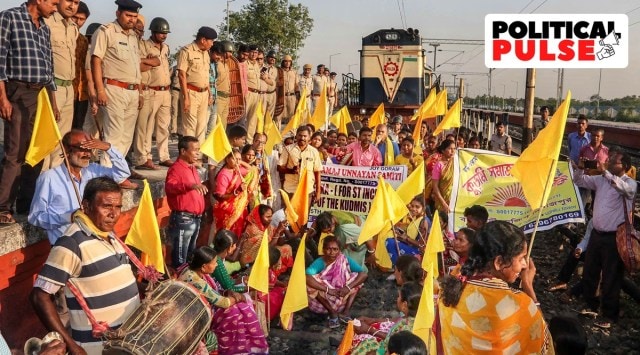Kurmis’ push for ST status, Adivasi women mistreated: Tribal situation simmers in Bengal
As BJP goes on the offensive, Mamata govt tries to resolve Kurmi issue via dialogue, acts swiftly in north Bengal incident
 Members of Kurmi community block railway tracks demanding Scheduled Tribe (ST) status, at Balurghat in South Dinajpur district of West Bengal. (PTI)
Members of Kurmi community block railway tracks demanding Scheduled Tribe (ST) status, at Balurghat in South Dinajpur district of West Bengal. (PTI) A five-day agitation last week by the Kurmi community in West Bengal for inclusion in the Scheduled Tribes (ST) list and an incident in Balurghat in north Bengal around the same time when four tribal women were made to perform “dandavat parikrama (circumambulation in a prostrate position)” as punishment for joining the BJP has shifted the focus on the struggle between the Trinamool Congress (TMC) and the BJP for the tribal vote in the state.
On Sunday, after five days of rail and road blockade in the Jangalmahal area of West Bengal, a section of the Kurmi protesters ended their protest. The Kurmis are rec as Other Backward Class (OBC), want to be recognised as a Scheduled Tribe (ST) community and want their Kurmali language to be included in the Eighth Schedule of the Constitution.
Though the blockade left rail and road traffic paralysed, sources said the government did not consider using force on the agitators because of possible electoral consequences. On Tuesday, a group of protesters met Chief Secretary H K Dwivedi but the two sides failed to come to a consensus on the demands. Kurmis were not included among the communities classified as STs in the 1931 Census and were excluded from the ST list in 1950. In 2004, the Jharkhand government recommended the community be added to the ST list rather than be categorised as OBCs. Following the recommendation, the matter went to the Tribal Research Institute (TRI), which held that Kurmis are a sub-caste of Kunbis and not tribals. Based on this, the Centre rejected the demand of Kurmis to be considered as ST.
Meanwhile, in Balurghat in Dakshin Dinajpur district, about 200 people defected to the BJP from the TMC last Wednesday. The BJP accused the ruling party of forcing four tribal women to return to the TMC the following day and, as atonement, they were made to perform “dandavat parikrama’”. A video of the incident went viral on social media on Friday. On Monday, state BJP president Sukanta Majumdar wrote to President Droupadi Murmu and the chairperson of the National Commission for Scheduled Tribes to bring the incident to their notice. While the BJP alleges that the TMC forced the women to do the “parikrama”, the ruling party and one of the women have claimed they did it of their own accord.
As the video of the incident triggered a backlash, the TMC quickly went into damage control mode and removed the Mahila Trinamool Congress’s district president Pradipta Chakraborty and, on Sunday, issued a statement appointing tribal leader Snehalata Hembrom to the post.
The ruling party’s calibrated response to both incidents highlights the importance of the tribal vote ahead of the coming panchayat polls and next year’s Lok Sabha polls. According to the Tribal Development Department of the state government, the state’s tribal population is almost 53 lakh as per Census 2011, or about 5.8% of the state’s population. A high number of tribals live in the districts of Darjeeling, Jalpaiguri, Alipurduar, Dakshin Dinajpur, Paschim Medinipur, Bankura, Purulia, and Jhargram. In the four parliamentary constituencies in the Jangalmahal region and the eight spread across North Bengal, their share in the population rises to nearly 25 per cent.
In the 2019 Lok Sabha polls, the BJP won both the Alipurduar and Jhargram Lok Sabha constituencies, which are the only parliamentary seats reserved for STs in the state. But in the 2021 Assembly elections, the TMC managed to regain some of the lost ground and the BJP failed to win a single Assembly segment in Jhargram. The party, however, retained its hold on Alipurduar, winning all seven Assembly segments that are part of the constituency.
“The TMC is anti-tribal and it has been proved through several incidents,” said Sukanta Majumdar as these issues flared up last week. “The latest being the way four tribal women were treated after joining the BJP. We strongly condemn such acts. We will continue to stand by the tribal population.”
The TMC, meanwhile, said the party works for all, irrespective of caste, creed, and religion. “Our party believes in unity in diversity. We give importance to all irrespective of their caste, creed or religion. We believe in the unity of people while the BJP believes in dividing the people along religious lines. To our party, the welfare of everyone is a priority,” said TMC state general secretary Kunal Ghosh.



- 01
- 02
- 03
- 04
- 05




























